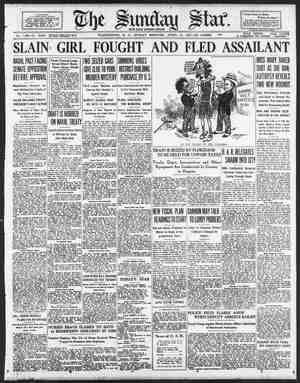Evening Star Newspaper, April 13, 1930, Page 92
You have reached the hourly page view limit. Unlock higher limit to our entire archive!
Subscribers enjoy higher page view limit, downloads, and exclusive features.
THE SUNDAY STAR, WASHINGTON, D. C, APRIL 13, 1930. D. C. Volunteers ot 1861 Saved Capital Enthusiasm for Service Was Marked, as Citizen Soldiers Prepared for Series of Outstanding Duties of War—Guarded Nation’s Official City With Little Assistance Until Arrival of 6th Massachusetts Regiment—Inauguration of Lincoln Depended on Their Braverv. BY JOHN CLAGETT PROCTOR. N the opinion of many, the people of the District of Columbia not only In 1814, after the British had destroyed the public buildings in Washington, and an effort in eonsequence was being made to remove the £ B 1861, when every called upon to do his patriotic duty, is an undeniable law: # “Now, therefore, I, Abraham Lincoln, Presi- dent of the United States, in virtue of the power in me vested by the Constitution and the laws, have thought fit to call forth, and hereby do call forth, the Militia of the several States of the Union, to the aggregate number of 75,000, in order to suppress said combina- and to cause the laws to be duly executed. appeal to all loyal citizens to favor, facili- and ald this effort to maintain the honor, and the existence of our National ] , and, in every event, the utmost care will be observed, consistently with the qbjects aforesaid, to avoid any devastation, any de- struction of, or interference with property, or any disturbance of peaceful citizens in any part of the country; and I hereby command she persons composing the combinations afore- said to disperse and retire peaceably to their :tzective abodes within 20 days from this wi “Deeming that the present condition of pub- presents an extraordinary occasion, in virtue of the power in me Constitution, convene both it Esi : g ] By g consider and their wisdom, determine such measures as, the public safety and interest may seem to de- mand. “In witness whereof, I have hereunto set my bhand, and caused the seal of the United States to be affixed. “Done at the City of Washington, this 15th day of Aprfl in the year of Our Lord Luther C. Ladd, a Massachusetts volunteer, first victim of the Civil War. & one thousand eight hundred and sixty-one, and of the independence of the United States the eighty-fifth. “By the President ABRAHAM LINCOLN “WILLIAM H. SEWARD, “Secretary of State.” DID the patriotic men of Wasii.gwn wailt for this proclamation to be issued before volunteering their services? They did not. Nor did they wait until the city was captured ov those not in sympathy with the Union, but. on the contrary, for more than three months be- fore this call was made they had been recruite ing and drilling and preparing to protect the city and the Government, and at the inaugura- tion of the President, more than a month be- fore the proclamation was issued, the District militia was the strongest support the Federal Government had in the city, and, according to those in a position to know, without their patriotic support, Lincoln could not have been inaugurated in the usual way on March 4, 1861, The writer has said that the District Volune teers did not wait for the Presidents proclamae tion before joihing the Federal service, and the Army records will show that as early as April 9, 1861, 10 days before the arrival of the 6th Massachusetts Regiment, the following order was issued by Secretary Cameron to muster in the District troops: “War Department, *Washington, April 9, 1861. “Maj. Gen. R. C. Weighiman, “Commanding Militia of the District of Columbia, Washington: “Sir: Under the twenty-fourth section of the act approved March 3, 1803, the President de- sires that you call out, to be mustered into the service of the United States, ten companies of militia, constituted preferably of the uniformed volunteer companies. Maj. McDowell, assistant adjutant general, will muster the troops into the service of the United States as soon as presented. “I am, sir, very respectfully, rou. . servant, iient “SIMON CAMERON. “Secretary of War.” The Star, always on the side of law and order, in its editorial column of April 10, gives its whole-hearted support to the instructions communicated Gen. Weightman calling out the local militia, and says: “The order for a muster of the District Volunteers today, at their several armories, had in view the inspection of their arms and equip- ments. And, further, to muster as many of them into the service of the United States, by companies, as may be willing to enter it; the services of seven companies being at this time required by the Government, which does not propose to permit the lives and property of the people of the Federal Metropolis and the public archives to become a prey to any marsduding expedition from any quarter, gotten up under the auspices of the oligarchy. “The commanding officer of the regular troops at this point, Col. C. F. Smith, of the 8th Infantry, will station them as may best serve the purpose of the city’s defense. “Most of the men will be required, doubtless, to spend the nights in their several armories, and will be permitted to attend to their usual avocations during the day—but always within the usual call * * *” To what extent the District Militia responded to this order may be judged by the report of Gen. McDowell, which reads: “Washington, D. C., April 12, 1861. “Col. L. Thomas, “Adjutant General, U. S. Army: - “Colonel: Yesterday 1 mustered into the service the following companies of militia: Capt. Towers’, aggregate 54; Capt. Kelly's, aggregate T
